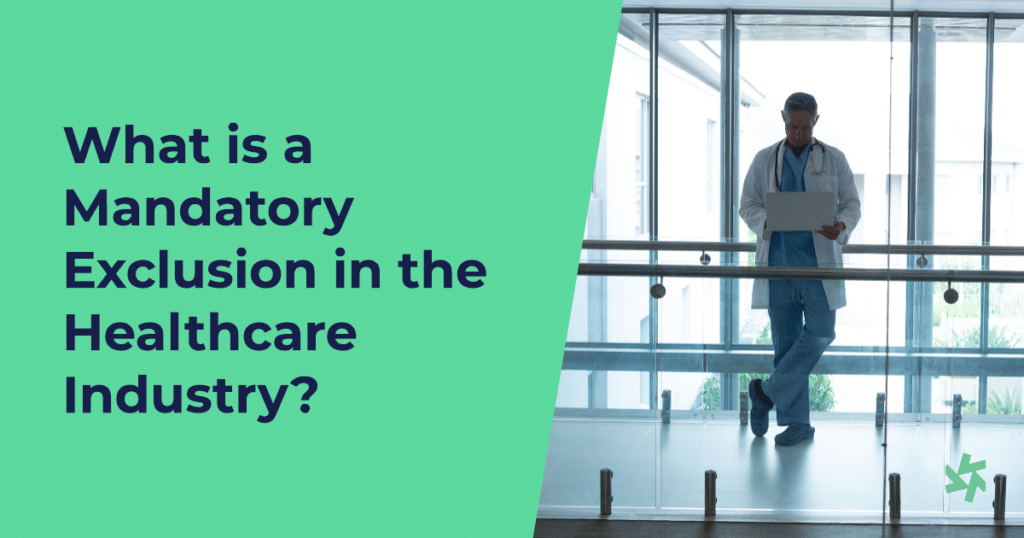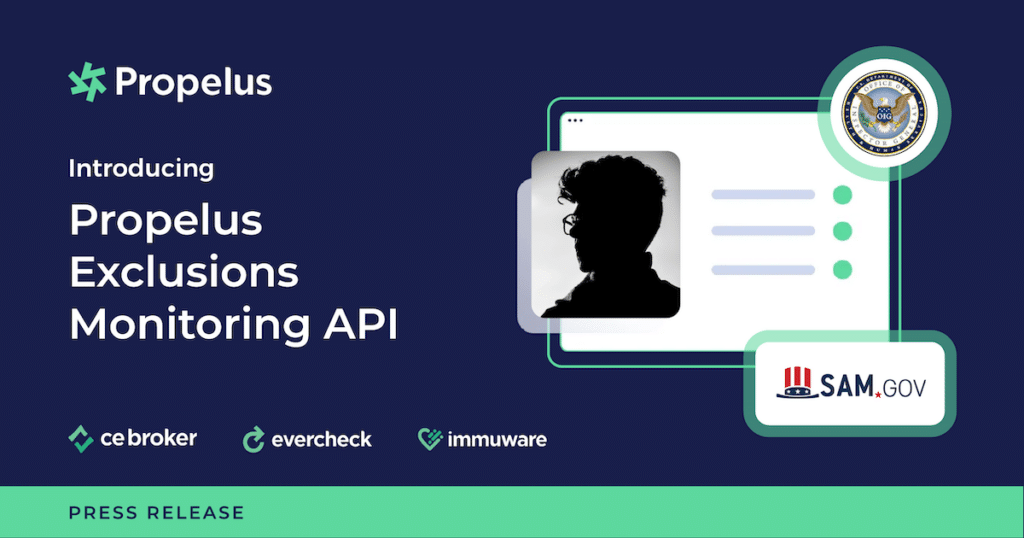What is a Mandatory Exclusion in the Healthcare Industry?

Protecting patients and employees within the healthcare industry is critical for leaders and healthcare HR professionals. The Office of Inspector General (OIG) must, by law, ensure that individuals and entities who have committed fraud, waste, or abuse can no longer participate in federal healthcare programs, like Medicare or Medicaid. In this blog, we explore what a mandatory exclusion is and the impact it can have on a healthcare organization or individual. We’ll also share some key ways you can work to avoid issues with mandatory exclusion through regular audits and compliance checks. Definition of Mandatory Exclusion Mandatory exclusion is a legal requirement to exclude participation in federal healthcare programs following an individual or entity’s conviction for various criminal offenses. Common reasons for being included on the list include Medicaid or Medicare fraud; fraud related to the State Children’s Health Insurance Program (CHIP), Tricare, or other state programs; patient abuse or neglect; felony convictions for fraud, theft, or other financial misconduct; and felony convictions involving the unlawful manufacture, distribution, prescription, or dispensing of controlled substances. Those organizations or individuals who find themselves on this list cannot receive payment from federal healthcare programs. Keep in mind that you’ll also find permissive exclusions on the list. These exclusions may result from misdemeanor convictions related to healthcare fraud, fraud in a program other than a healthcare program, misdemeanor convictions for the unlawful manufacture, distribution, prescription, or dispensing of controlled substances, or the suspension, revocation, or surrender of a healthcare license due to issues of competence. The term of exclusion usually sits in the one to three-year range for these types of exclusions, compared to five years to indefinite exclusion with mandatory exclusions. Common Contexts for Mandatory Exclusions Mandatory exclusions impact the individual or organization on the list and can put your organization at risk. This impact is why organizations must check the list monthly to avoid finding themselves in legal trouble or at risk for non-reimbursement due to having someone on the exclusions list perform services on behalf of their organization. Exclusions apply to all employees, whether licensed or not, as well as contractors, vendors, and referring physicians. Many state Medicaid bulletins suggest monthly monitoring of ordering and referring physicians, underscoring the importance of regular checks to ensure compliance. Consequences of Mandatory Exclusion You’ll find immediate and long-term consequences if your organization or an individual working within your organization finds themselves on the list. Mandatory exclusion usually results in a minimum of five years on the list, but this can be indefinite depending on the severity of the crime or issue that got you on the list. Professional licenses, certifications, and employment will likely be revoked, leaving you with little choice but to find another type of employment. Your reputation within the healthcare industry will be damaged because of this exclusion, and you’ll find that financial penalties can be imposed on you during the exclusion process. In order to get yourself off the list can be a very long and costly process, with many individuals and organizations finding it impossible to remove themselves from the list following their addition. For employers, the impacts are equally significant. Federal health care programs will not make payments for any items or services furnished, ordered, or prescribed by an excluded individual or entity. The payment prohibition extends to the excluded individual or entity, anyone employing or contracting with the excluded party, and any hospital or other provider for which the excluded party performs services. While there is a limited exception for certain emergency items or services not provided in a hospital emergency room, the broader implications of exclusion pose significant operational and financial risks for employers. Avoiding Mandatory Exclusions To avoid mandatory exclusion, ensure that you always follow the best practices set by the industry and the regulations surrounding state healthcare programs. Compliance checks and regular audits can help you avoid getting on the list yourself and stop you from engaging with anyone on the mandatory exclusion list. Should you find out that someone you employ or work with is on the list, it’s critical that you immediately take action to stop your involvement with them. The list is updated each month, usually in the second week of the month. It’s important that your team gets into the habit of regularly auditing the list and your employees so that you can take action should someone appear on the list. When hiring a company or working with a new employee, review the list before offering them employment or setting up business contracts. These steps protect your organization and its reputation and will help you avoid ending up on the list yourself for fraud or other illegal activities. Conclusion | About Propelus Understanding and avoiding mandatory exclusions is critical for anyone operating a business within the healthcare industry. Propelus can support your efforts. We recently announced the launch of our Exclusions Monitoring API, which provides monthly monitoring of healthcare exclusions and ensures exclusions intelligence is accessible how, when, and where it is needed for more informed, real-time compliance with ease. Additionally, our EverCheck by Propelus solution delivers the most up-to-date primary source data, including exclusions monitoring, so you can have confidence that your workforce is compliant and in good standing. By remaining in compliance, you’ll work to protect your reputation, avoid potential loss of trust, and ensure you also don’t end up on the list in the future.
Propelus Launches Exclusions Monitoring API to Help Organizations Proactively Detect and Prevent Healthcare Fraud, Waste and Abuse

Following the launch of its Primary Source Verification API, Propelus today announced the launch of its healthcare Exclusions Monitoring API. The Exclusions Monitoring API is part of the company’s data solution offerings and is designed to ensure healthcare providers, payers, vendors, and contractors take appropriate compliance measures to safeguard against fraud, waste, and abuse. The Department of Justice (DOJ) estimates up to $100 billion annually is lost to healthcare fraud, waste and abuse. Individuals and entities who have been involved in fraudulent activities are added to federal and state exclusion lists, which prevent payment from being made to the excluded party, as well as any hospital or other healthcare provider where the excluded party provided services or was otherwise engaged. Additionally, hospitals and healthcare organizations face severe legal consequences, costly civil monetary penalties (CMPs) and fines, and reputational damage when engaging with individuals or entities excluded from federal healthcare programs or government contracts due to previous misconduct resulting in an exclusion. “Healthcare organizations and payers serve an important role in mitigating fraud, waste, and abuse and are responsible for not engaging or paying for any services from any individual or entity that is excluded. Our OIG compliant Exclusions Monitoring API provides monthly monitoring of healthcare exclusions and ensures exclusions intelligence is accessible how, when, and where it is needed for more informed, real-time compliance with ease.” – Julie Walker, CEO of Propelus. Complementary to the Propelus Primary Source Verification (PSV) API with daily monitoring of over 8,300 licenses, certifications, registrations, sanctions, and more source types, the Propelus Exclusions Monitoring API empowers on-demand, bulk submissions with identity resolution, indexing and reconciling identifiers, and match capabilities to ensure any excluded individual or entity is detected. It delivers the most up-to-date exclusions data through monthly checks against primary sources, while ensuring proper connectivity within the broader compliance management ecosystem for better workforce compliance operations. The Exclusions Monitoring API monitors the following federal and state exclusion lists: HHS-OIG LEIE: Health and Human Services (HHS), Office of Inspector General’s (OIG) List of Excluded Individuals and Entities (LEIE) GSA SAM: General Services Administration (GSA) System for Award Management (SAM) – the SAM.gov database is formerly known as the GSA list of Excluded Parties Lists System (EPLS). All currently available (45) State Medicaid Exclusions Lists: Many states maintain their own exclusion lists to identify individuals or entities barred from participating in Medicaid programs due to fraud or other violations. For more information about the Propelus Exclusions Monitoring API and how it can support your organization’s workforce compliance efforts, visit propelus.com/api. Newswire Press Release
